Facing the future
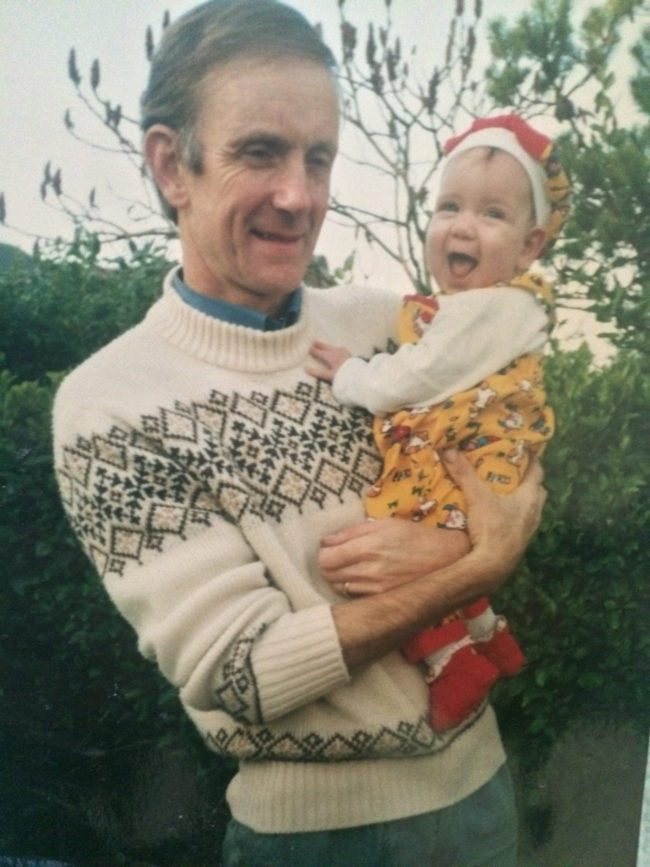
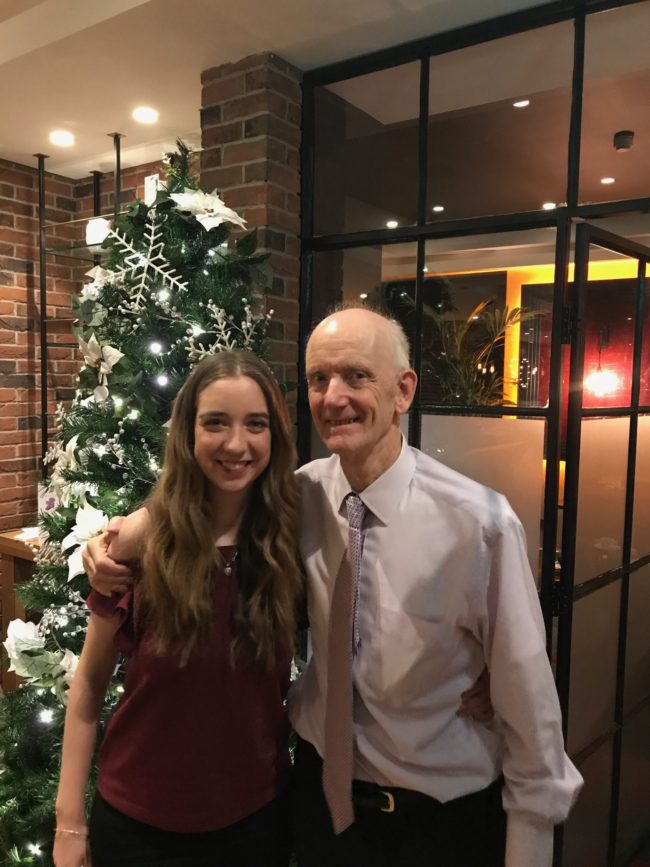
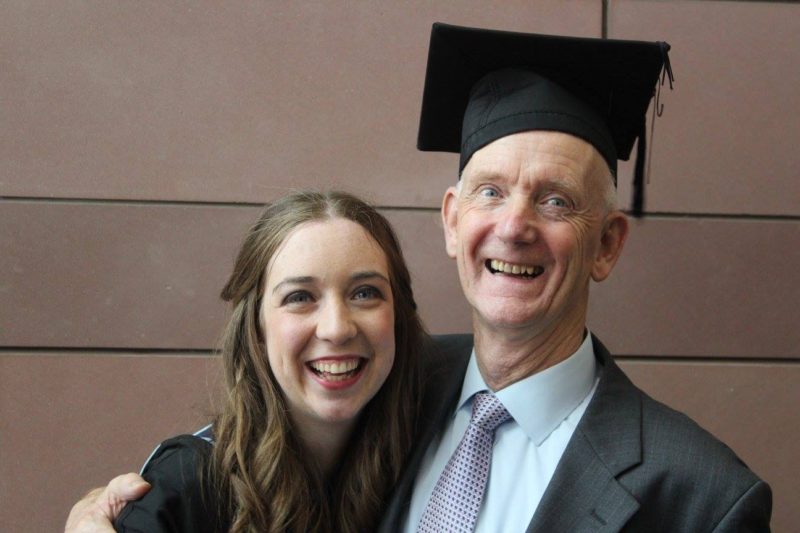
Hello, my name is Joy and I am a 27 year old school teacher living in Yorkshire, but I am originally from Cork, in Ireland, where I have lived for the majority of my life. I am currently at risk for Huntington’s disease and I have chosen not be tested at this time.
Huntington’s entered my life the summer of my 20th birthday. I had just finished my first year of Drama at university, I had a great job and life was pretty good. When I was 14 my Dad had a stroke but recovered quite well and even went back to his job as a postman until his retirement.
My Mom (a retired nurse manager) started to notice some subtle, unusual symptoms in my Dad in the years after the stroke. During this time my Dad’s first cousin in the UK received a diagnosis of Huntington’s. My Mom put two and two together and asked our GP could he get the test.
I remember at the time thinking that surely my Dad couldn’t have Huntington’s, the chances were so low. I remember talking about it with my mother and my older siblings (three sisters and two brothers) . Dad had other older siblings who were fit and healthy and his mother died in her 80’s of a stroke. It seemed very unlikely that Dad would test positive. The test was only a precaution as Dad (at this point in his mid 60s) didn’t display the usual Huntington’s symptoms.
I didn’t think about it much to be honest, I was too busy loving life and feeling grateful for my friends, family and my beloved nieces and nephews. My parents were retired, doted over their grandchildren and had bought a caravan and new car. They had major plans for the future entering the next exciting phase of their lives in their retirement.
I will never forget the day my sister picked me up in Cork City on a gorgeous sunny day and told me Dad tested positive for Huntington’s disease. I was shocked, upset and numb. I felt sick, confused and completely and utterly devastated. I became overwhelmed thinking about my father’s future. My Dad, my rock, the pillar of our family. I began to mourn the future I wasn’t sure that I would have, and then the worry began for my siblings, nieces and nephews and mother. I felt as though my amazing family were cursed and the worry was crippling, with little to no hope in sight. My boyfriend at the time was such an incredible support for me. I felt I couldn’t go to my family with my anxieties as I did not want to burden them, as we were all going through the same thing. This was a first for me, as I would always turn to my family for support.
That almost eight years ago. My father has deteriorated, but can still walk, eat, talk, hug his grandchildren. The disease did not progress in my father in the ‘usual’ way which was incredibly misleading. Two other families who live in our estate also are Huntington’s families, which leads me to believe it’s not as rare as what people think.
Initially when I researched Huntington’s I thought my Dad would be dead in a year or two. I also thought that by now I could be showing symptoms if I was positive. However, this was not the case, Dad is still here, and we are all living very busy lives. One of the websites that gave me real hope, as well as lots of information, was HDYO. I cried when I found it because it was so different to so much of the information on the web. It had information about testing, about late onset and Juvenile Huntington’s. It showed people living their lives and supporting each other. Reading the HDYO website and watching their videos changed my life and outlook, for the first time I felt hope. I began counselling and slowly started to find joy in life again!
The Huntington’s Disease Association of Ireland has been an incredible help to me and my family over the years. They provided me with free counselling sessions and have been instrumental in creating memories over the last few years. This included attending the HDYO European Youth Camp for a week in Kent. There I met young people from all over Europe who were in a similar situation to me. We attended outdoor activities events, discussion sessions, and met world leading scientists. And we laughed and we cried. This experience really helped build my confidence and I began to have hope for my future. In 2018, my Mom and I were also given the opportunity to travel to Rome with other families from Ireland and we met the pope in a worldwide Huntington’s disease event. After these experiences I certainly did not feel alone anymore, suddenly I had a wealth of people I could talk to and life started becoming a lot more optimistic.
Some of my closest friends have been a big support to me over the years. I know talking to some of my friends that they worried a lot about me, and I think they are equally a part of this story. One of my best friends, who completed her MA in Playwriting, wrote a play on Huntington’s for her dissertation, which was amazing! I feel like I have a strong community of friends and colleagues who support me.
I think about getting tested a lot, but often put it to the back of my mind. I am happy holding on to the hope that I have a 50% chance of not having it. Perhaps this will change if I want to have children in the future. Dating while being at risk can be complicated too. Should I tell him I’m at risk at the beginning? A few months in? For now, I am waiting for the right man to come around.
I had initially planned to do a video interview for this campaign but decided last minute against doing it. Mainly because of the fear of the internet and wider world knowing about my family history so publicly. This is difficult for me because I feel we need more awareness but we are all too afraid to talk about it. By talking about yourself, you as a result are talking about your family too and sharing information that they may want to keep private.
This has had a huge impact on my life. At times it is frustratingly sad and difficult and other times life is still so normal. My family is so close now and we are in absolute awe of my Dad who has faced Huntington’s like a warrior. My mother (his carer) has shown him so much love and they are both enjoying life to the fullest. We are all so supportive of each other and I tend to live life day by day. I enjoy precious memories with my family, and they are always face timing and calling me whilst I am here in the UK.
Who knows what the future holds but I will face it with optimism, grit, hope and joy! 🙂
Huntington’s and me
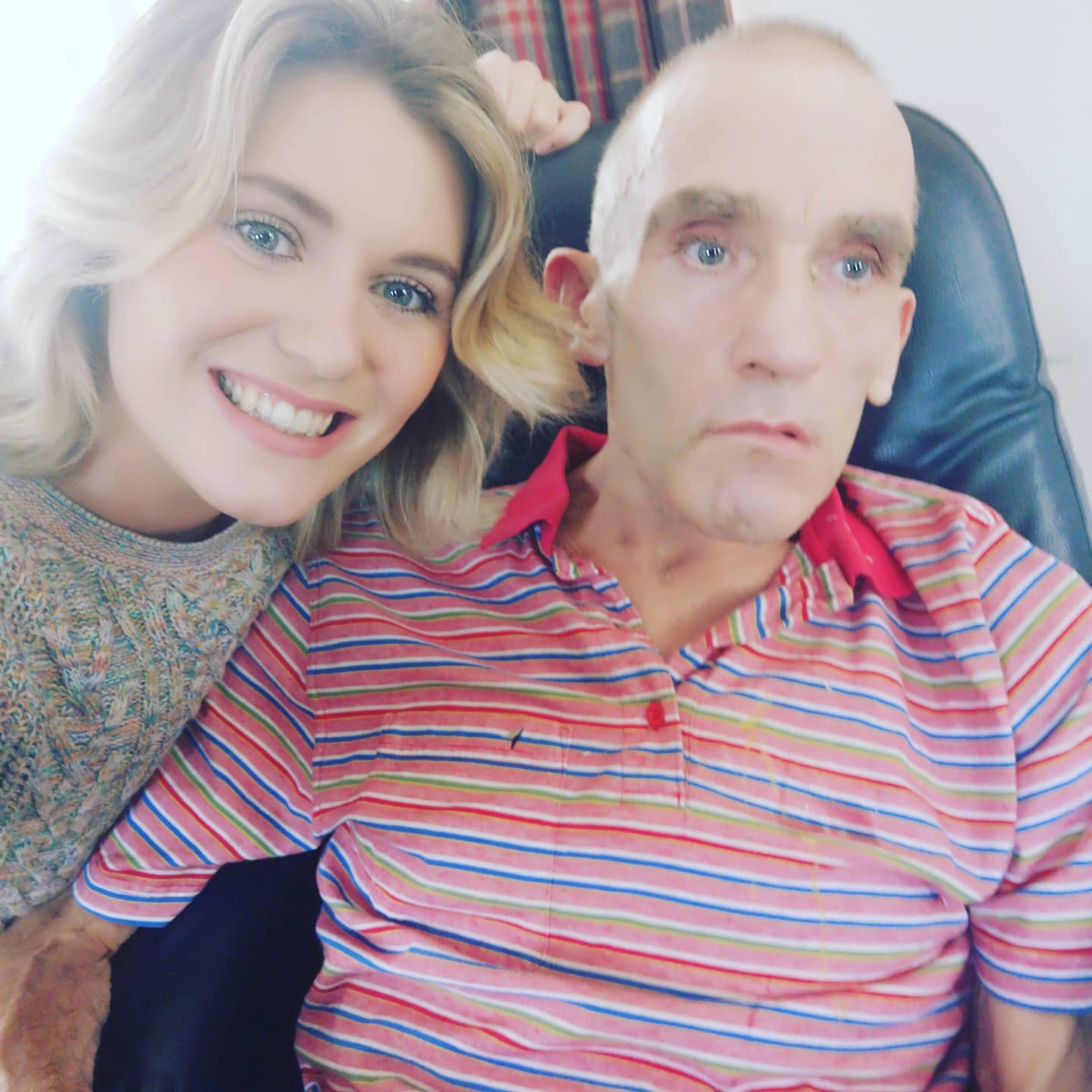
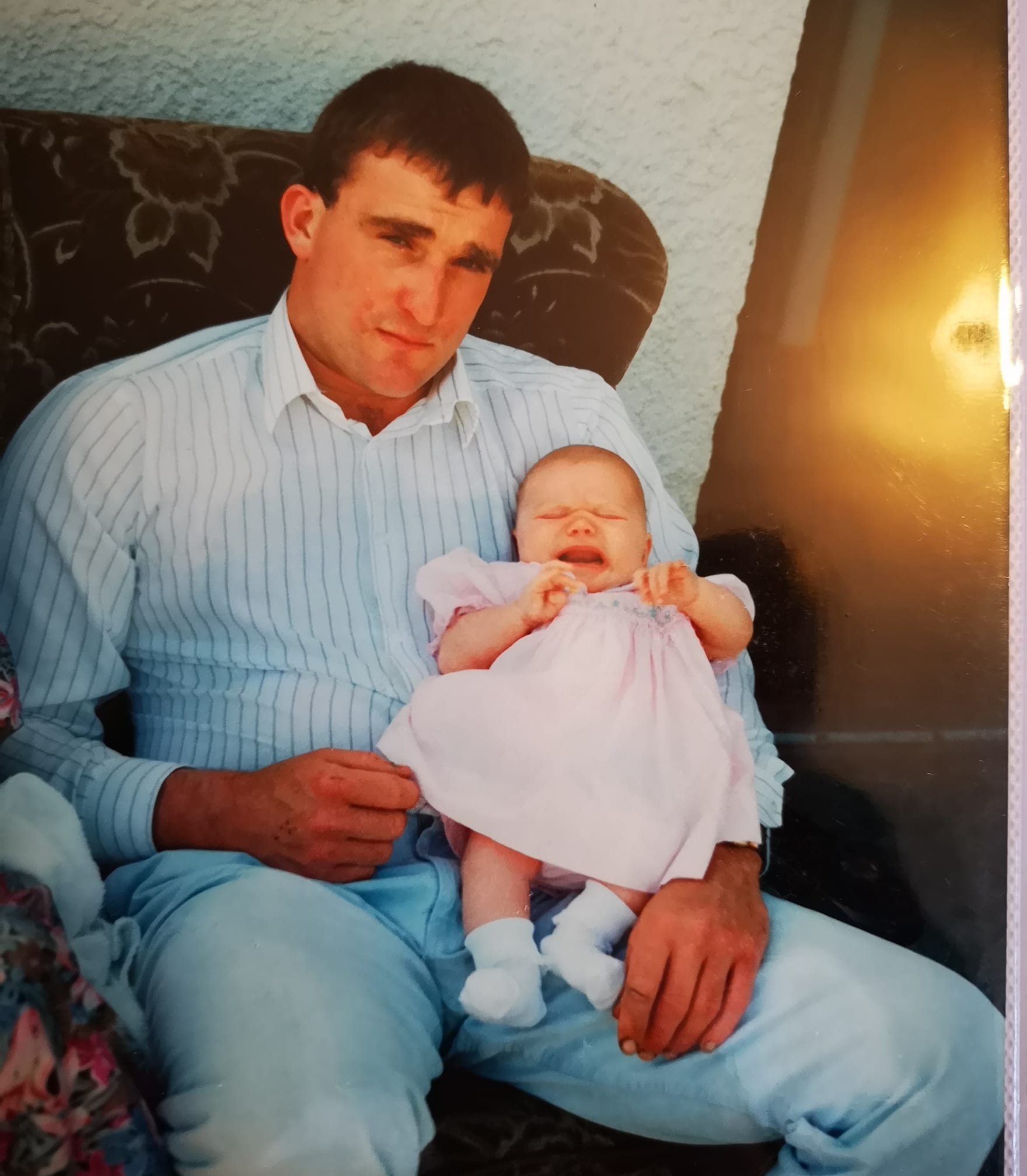
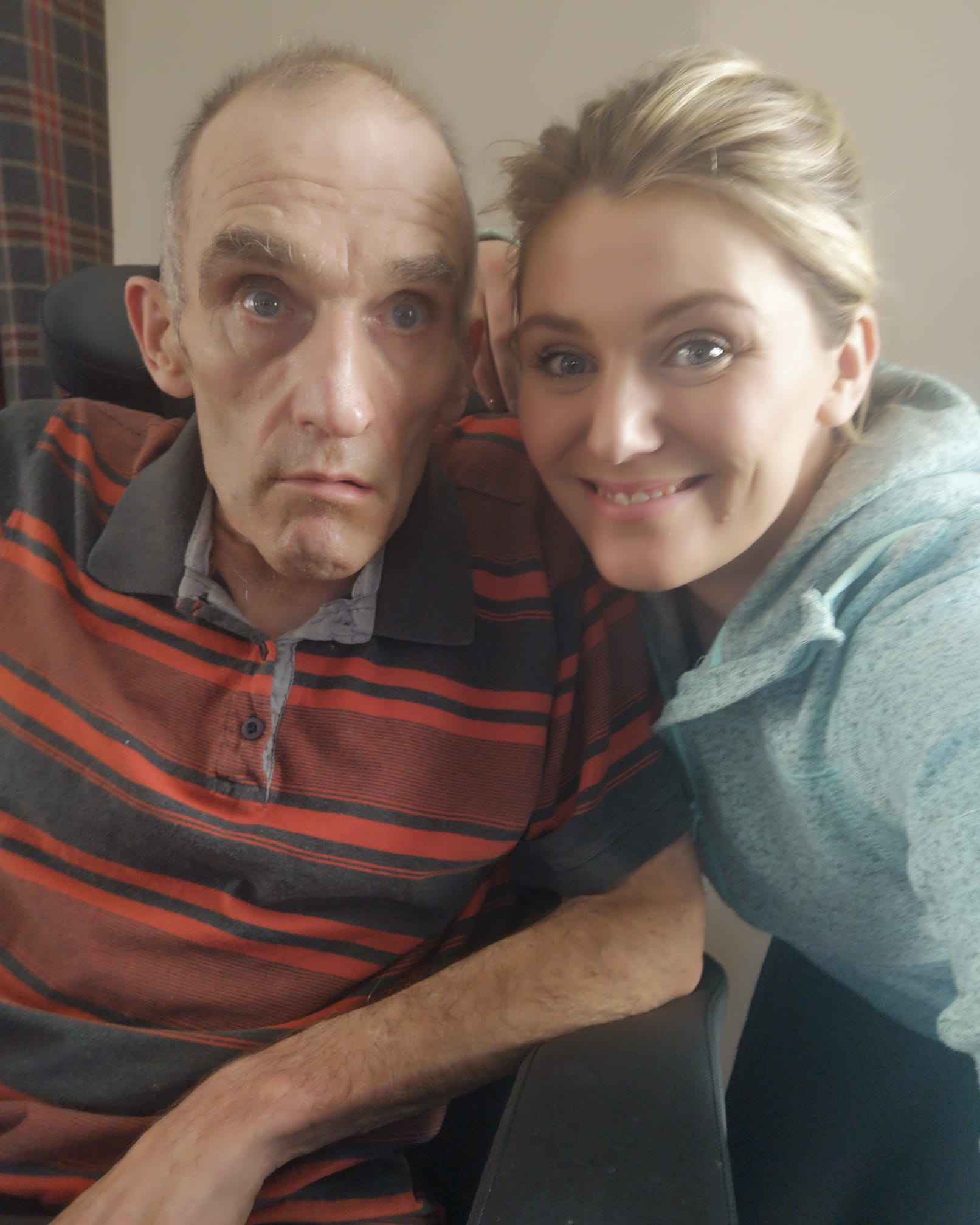
Huntington’s Disease can affect people in many different ways, and it certainly affected my life in a big way.
Everyone affected by Huntington’s Disease has a story, some are similar and some are very different, everyone has different stories, experiences, and as we all know, Huntington’s disease is different in each person.
After many years of coming to terms with Huntington’s Disease and the impact it has on my life, I truly do believe that the best thing I can do is raise awareness, talk about Huntington’s and try to reduce the stigma of Huntington’s. I believe this is my way of turning something that is and can be very negative in my life, into a positive. There is an awful stigma around Huntington’s disease, where people are scared and ashamed of what others will think. I believe reducing the stigma and talking more about HD is the most important thing we can do, people and families should not feel ashamed about this disease, children should not wonder if their friends will understand and HD patients should not feel ashamed of the genes!! Something none of us can control!
I want to share with you a brief history of my life, and hopefully share how speaking out about this has helped me over the years.
When I was around 14 years old, my Dad was diagnosed with Huntington’s, and sadly our relationship was broken at the time. We had gone from the typical Daddy-daughter relationship to not even talking I was getting the brunt of his anger which was caused by the disease. Fast forward three years and at 17 I became a carer for my Dad, his fiancé left him, and he needed help with daily tasks. My brother Ryan and I rallied around with my Mum (Dad’s ex-wife) and got him the care he needed. We arranged for care assistants to visit him daily and my brother and I divided up the other tasks. At this point I was able to manage on my own, so my brother wasn’t needed as much, but as the illness took over my dad, Ryan stepped in more and more to help me. We became a team, sometimes a dysfunctional team, but we always had Dad’s best interests at heart.
At the age of 18, I was obsessed with being tested for Huntington’s, and to be honest from the age of 16 – 18 I thought it was unfair that they made you wait until 18 years old to be tested. I started the testing process, and after several appointments and months of upset, I decided to pull out before blood was drawn. This is a whole story in itself, but let’s just say 10 years on, I think it was the right decision for me at the time. I am at peace with not knowing and one day, when I find Mr Right, and decide to settle down, I will get tested. For me, children are a huge thing, and getting tested and children for me go hand in hand. This is a personal choice and I know everyone is different.
Over the years, dad and I fought, I cried, he shouted, we both laughed and took A LOT of selfies. It wasn’t always easy and there was a time where I was juggling A-levels/university, volunteering, one or sometimes two jobs, caring for dad, and my own personal social life. It was a balancing act and I didn’t always get it right. I was late to appointments, I forgot to bring his list of medication, I missed friend’s birthdays. Sometimes I didn’t have enough money to bring Dad somewhere and hang out with friends, so I let my friends down. I sacrificed a lot, missed out on some things, but always managed to get through the tough days!
My brother and Mum made it possible for me to attend university which was two hours away from Dad. My brother and Mum made it possible for me to travel to America for two summers to work at a summer camp teaching watersports. Friends and other people in our local community made it possible for Ryan and I to continue our education and get a break, helping Dad with small tasks. Simple things, when Dad would walk the minute to our local shop, they would deliver the large bag of dog food to his house, instead of having him carry it. If dad left money behind at the local pub when he had enjoyed a Friday night meal, they would call and let us know. Certain members of our local village community kept an eye on Dad when Ryan and I weren’t around.
Every Huntington’s story is different, some families have wonderful support systems, some don’t. Some families have a lot of help from their medical team and some struggle to get a social worker. Luckily, we have a good medical team (at times) and amazing friends. My Mum, Ryan and I worked together over the years to make sure Dad has had what he needed. It wasn’t always easy, and I hope those who are reading this understand that I am not trying to paint an image of a perfectly easy life, but I try not to dwell too much on the past. I could tell you about times that I left my Dad’s house because I was scared for my safety. I can tell you about the nasty things he said to me such as ‘I’ll burn you out of your house’. What good will that do though, it wasn’t really my Dad. My Dad loved me, and I choose to remember the times where he taught me how to drive a speedboat and played house with me when I was a child. I have more memories and years of Dad being sick than I do of him being a fit and healthy man, but I don’t want to resent my Dad, and I don’t want to blame him for the hardship I have endured. He didn’t ask for this life. None of us did.
Dad is 54 and lives in a nursing home close to my brother and I, so we can visit him regularly (pre Covid), and keep him up to date on what we are doing. I love sharing photos with him and telling him all the local gossip!
My life hasn’t been easy, but I don’t think it has been one of the hardest either. I am very aware that there are many people out there worse off than me. I try not to dwell on the negative, and remind myself of the positives that Huntington’s has brought into my life.
Huntington’s disease made me sit up and pay attention, I made memories with Dad when I could, and only wish I could have made more. I have made more friends around the world who are also affected by this and I cherish my friendship with them! I have met authors and attended some of the most amazing Huntington’s conferences and summer camps. I have made a career and hobby out of Huntington’s, writing about my experiences on the #ImNotDrunk Lifestyle Blog, sharing with others what it is like to grow up in a Huntington’s family, trying to help those who might be coming behind me.
I am thankful for what this has provided for me, and I am grateful for the journey I have had and whatever the future might hold for me. I welcome it as a new challenge and a new opportunity.
Ashley Clarke
Northern Ireland
Our Family & PGD Story

My husband may have Huntington’s Disease, we don’t know, and we don’t want to know. Six years ago I gave birth to our gorgeous twin babies and we know for sure that they don’t carry the gene.
Finding out my husband’s (boyfriend at the time) Mum had Huntington’s and immediately discovering that he also had a 50/50 chance of having it too was terrifying and heart-breaking, and all those other horrible emotions that bring you to a very dark place. I think it was harder since we didn’t know anything about Huntington’s at the time and we had to hunt for information to understand it. We did our research and there was of course lots of crying and worrying. At the time we got lots of support and information we needed from the Huntington’s Disease Association of Ireland and we finally came to a place of acceptance that this is something we may have to deal with in the future. After a time, life got back to normal and we put it to the back of our minds as much as possible.
Then we got married and decided we wanted kids. We were still not ready to find out if my husband has the Huntington’s gene and thought our only options were to either go ahead and hope our children would not have the gene or make a decision that we would not have children. I wasn’t comfortable with either option so spoke to our GP. She suggested PGD, which is an extra step in the IVF process where they complete a genetic test on cells removed from embryos to avoid a genetic disease for which a couple is at risk.
I spent some time on the internet researching clinics at home and abroad and sent an email to all clinics explaining our situation and setting out my main request – was it possible to have PGD but not find out if they found any embryos with Huntington’s disease? After all, this was our main reason for going down this route – we were not ready to find out if my husband had the gene. We were reassured to find out that this was possible.
This was something that we wanted to keep checking at the beginning. For example, we had to fill in in some standard forms about our medical history and myself, my husband and both his parents had to send blood samples to the clinic. I added a note reminding them that we did not want any results from these blood tests.
The whole process was actually okay. Although the clinic we chose was abroad I had to find a local GP to support me. My doctor at home was great, and the clinic overseas was lovely too. Everybody we met throughout the process was kind and supportive and it wasn’t too stressful or even too invasive. Along the way there were prescriptions, scans, some needles (!), an egg retrieval process that wasn’t as bad as I expected and then finally the egg transfer.
The whole experience really wasn’t as stressful as I expected, the worst part about it was the two week wait after the transfer. A whole two weeks of waiting to see if it worked. It did though and we couldn’t be happier.
If you decide to take this journey, I truly hope you are as lucky as we are. We now have six year-old twins and I don’t have to worry that they carry the gene. Yes, we still face challenges ahead with Huntington’s impacting our family and we may face more challenges in the future if my husband or sister in law have the gene but the medical world is always moving forward so I have hope that treatment plans or medical trials are always improving and that someone will find the breakthrough that the community is desperate for. Until then, it’s important to create more awareness so that people are aware of this disease so we can look to them to support our fight and so that they understand and support those that suffer from Huntington’s and not judge them incorrectly.
By Siobhan
Our family story
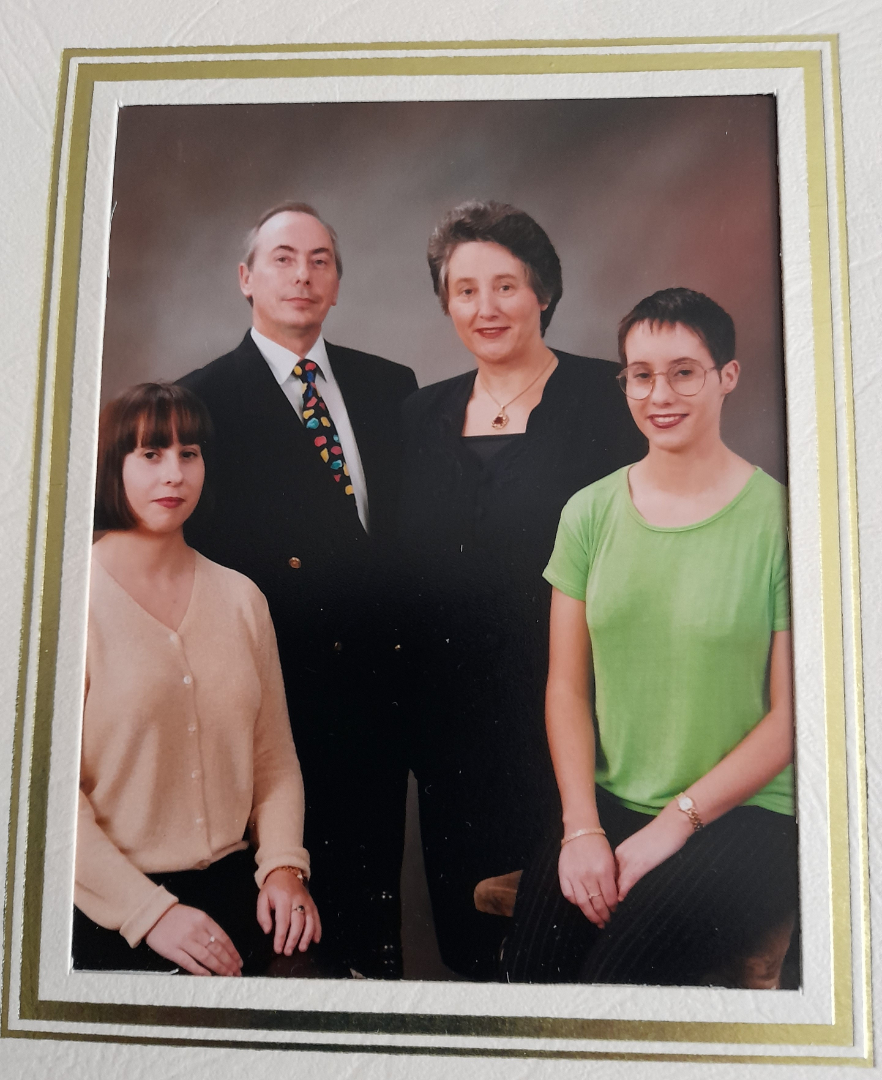
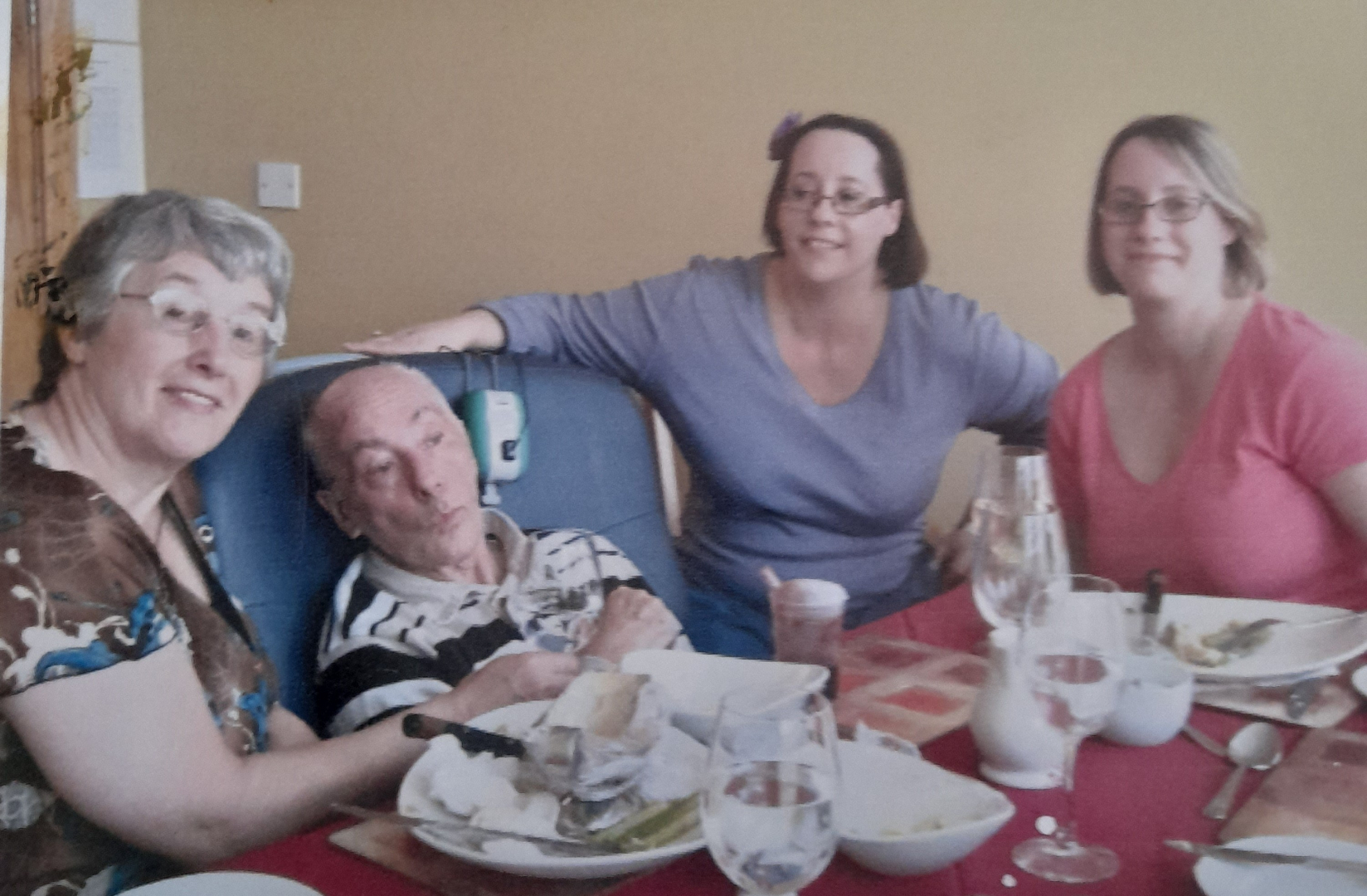
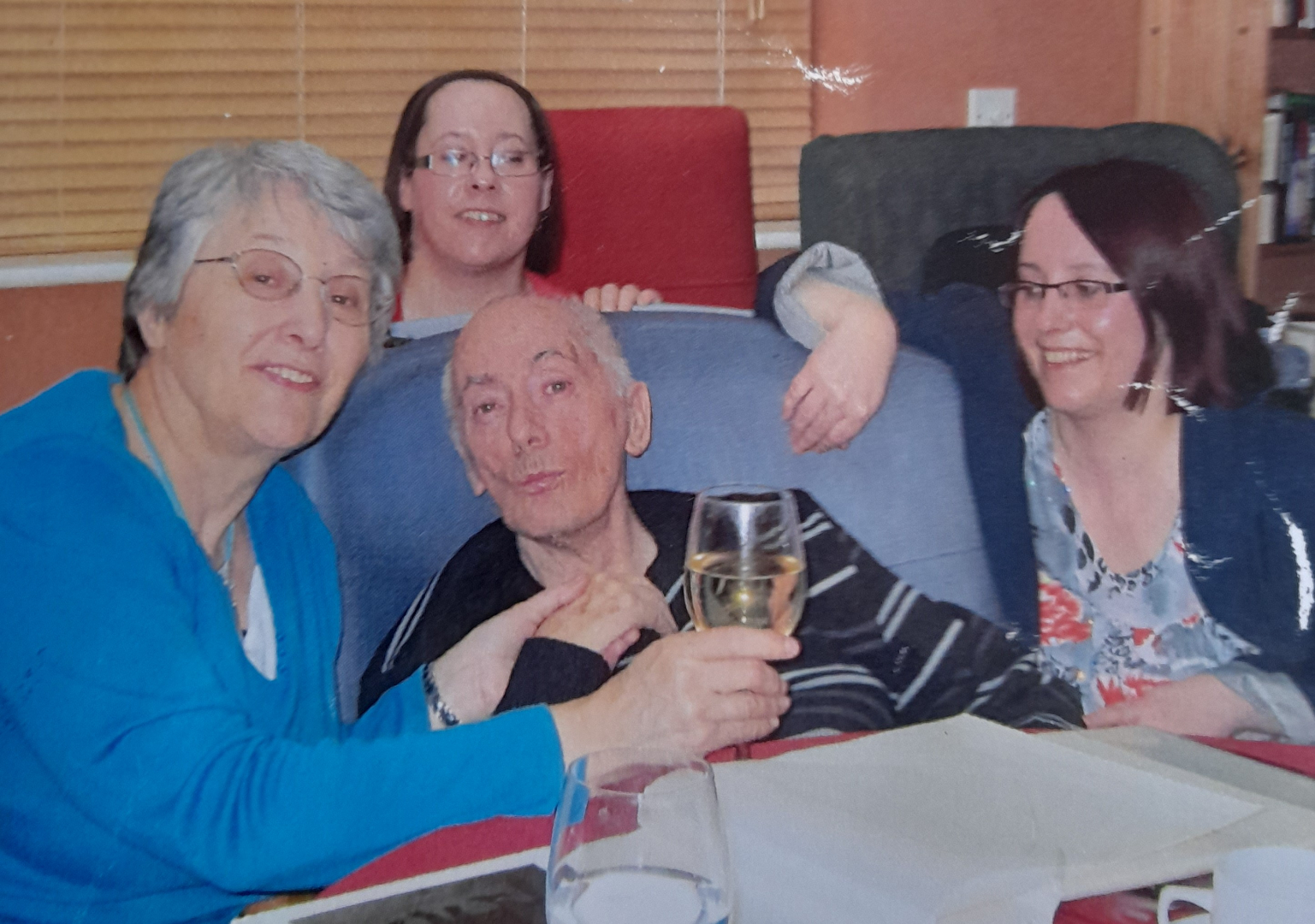
I’m pleased to be taking part in this campaign and to have the chance to tell our family’s story. I’ve got two grown up daughters who both have Huntington’s disease. It was passed down through my late husband Tony’s side of the family, although it was only with hindsight that we could track it back.
My husband’s Mum was told she had dementia when she was in her early fifties, but we now think that must have been Huntington’s. Tony was misdiagnosed with Alzheimer’s himself back in 1996, and it wasn’t until four years later that he was properly diagnosed with Huntington’s after a specialist spotted the smallest movement in his shoulder during a consultation.
Our girls, who are twins, Jennifer and Yvonne, were 26 at the time. Tony really didn’t want to tell them, he was really worried about how it would impact them, but eventually I convinced him he had to. He was reluctant to tell anyone in the family but we got everyone together and told them what we knew. Of course, everybody was absolutely devastated. It was very, very hard.
The girls both made the decision to be tested and so they knew from fairly early on that they carried the gene. They both made the decision not to have families, which of course was very difficult for them, as they both adore children. They had to stop working quite early on, they both struggled particularly with depression in their twenties. It was very hard for a while as Tony’s symptoms became worse, and they could become very distressed with some of his behaviour. Particularly if I was out of the house, it wasn’t really working to have all four of us under one roof. Eventually we reached the point where the best thing for Tony was for him to go into a nursing home, where we had expert care for him. They were absolutely wonderful from the start, it was a lovely place, and the team were fantastic, and became like an extended family.
What I found particularly difficult with the girls was that their Huntington’s journeys have been different. Both have had, and are still having, different rates of progression and different symptoms. That is hard to watch, and it is hard to be the one making all the decisions when things are particularly hard. I’ve had to make really difficult decisions. Because my girls didn’t have access to proper psychiatric care we had some very difficult and distressing incidents with them self-harming, attempting suicide, and making attacks on me. I had to call the Garda to help me manage, and for their own safety, and that’s something that I don’t think I should ever have had to do. Better access to the right services is definitely needed.
Both my girls are now in Bloomfields, which is a fantastic place. It has of course been very hard through Covid, as I haven’t been able to visit as I normally would, and it has interrupted the settling in process for Yvonne. On the other hand, I do feel that Covid has given me the space and time to grieve for Tony, which is so important. Just because somebody has a hard time with an illness like Huntington’s it doesn’t mean that their loss isn’t felt just as much. We were together from the age of 19, and we had some lovely times. He was a wonderful man, such fun to be around and an utterly dedicated family man who did everything for his daughters. They were his world, he couldn’t do enough for them, from the moment they were born that’s the way he was. When I’ve had to make hard decisions about care for the
girls I do that for both of us, thinking about what he would want for them too, protecting them for us both.
I know it can sound like there has been no joy in our life as a family but that just isn’t true. Before Tony’s illness we had a lovely life, both as a couple and then as a family of four. And after it, the girls and I did more as a family than we might otherwise have done. We didn’t know how long we had together before things became hard, and so we packed an awful lot in. We had so many holidays! More than we would have done if Huntington’s hadn’t been there, and I have some wonderful memories from that time. It’s important to me that people know that there can be good times too.
I am pleased to be able to share our story. I think there is a lot of grief and sadness for people who live with this horrible disease, and we have the power to uplift each other through telling our stories and finding things in common. Perhaps we can all give each other strength through doing so. Strength to fight that bit harder for what we need for our families, to face another battle, or to stay positive ourselves, which can be so hard.
I do know that being part of community helps. Being part of the HDA ‘family’ in Ireland was a huge comfort and support to me. I got involved very early on after Tony’s diagnosis and I’m so pleased I did. I think as a carer people often forget to ask how you are, and you can just be the one absorbing all the shocks and the difficulties and the pain. Your own health and wellbeing can suffer so much. So, the ‘Family Matters’ campaign is a good chance to help people understand how Huntington’s affects the people who do the caring too.
Anna P, Dublin.
Me and Christy
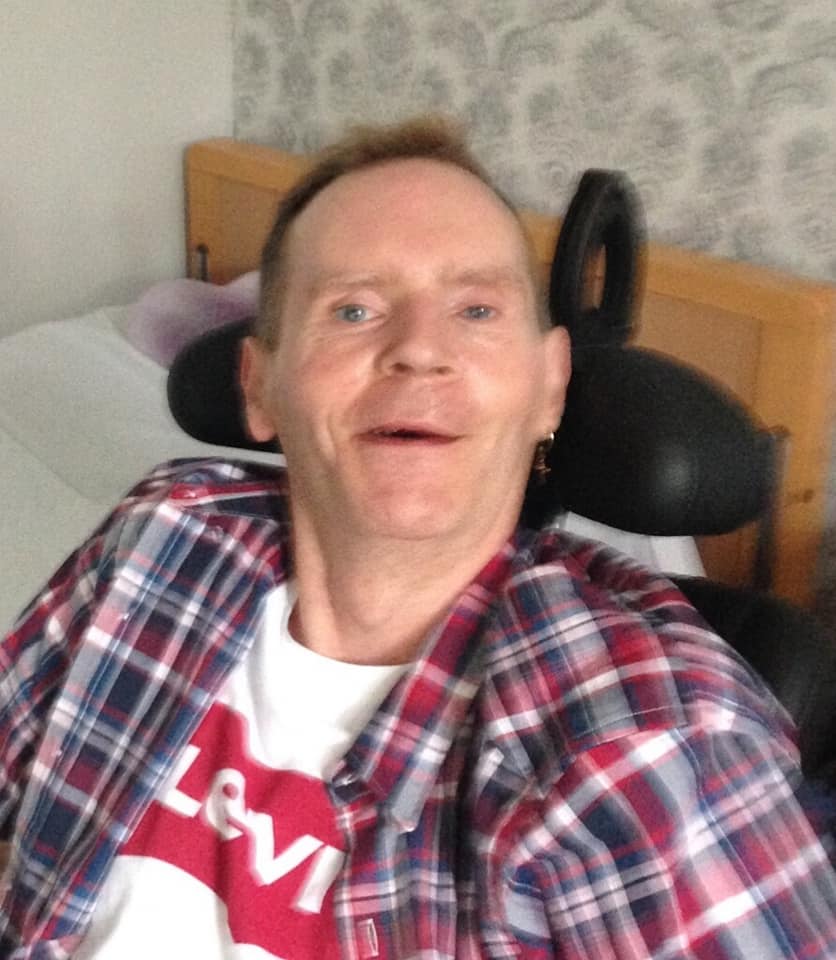
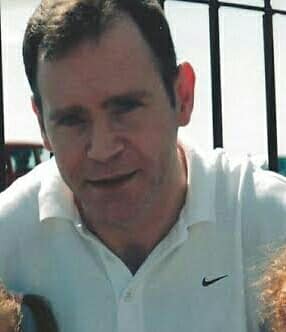
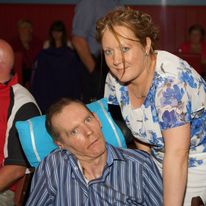
I met Christy at my brother’s wedding in Cyprus. He was this great handsome, tall man with loads of character, and we were friends before we became a couple. Once we did get together, we moved things along quite fast and I moved to Dublin to be with him a year after we met.
A couple of years after that he started having terrible headaches, really debilitating, and then had pneumonia more than once. He also developed a tremor and was a bit unsteady on his feet. It didn’t occur to me that it was anything serious at the time, I always put it down to something else. The shakiness seemed to be when he was with my family for instance, and I put that down to a nervousness around them. I didn’t put the various pieces together and just didn’t realise there was a problem. We knew Huntington’s was in the family but had no idea this was the beginning of Christy’s Huntington’s journey.
Things started unfolding when he was 32 and ran into trouble at work. He worked in security, and was suspected by management as drinking on duty. He was devastated, he loved his job and although he liked a drink he would never have done that. He couldn’t really prove it though and he lost his job which was a huge blow to him. It really destroyed him. He went to the GP, in an attempt to find a physical reason why, and eventually of course we found our way to a diagnosis. I had not really understood what Hungington’s meant until this, I remember looking it up and being devastated by what I learned. Christy’s Mum sat me down before confirmation, saying she believed it would be a positive result. Christy’s Dad had Huntington’s, it had caused so many problems in their lives, so his Mum saw the signs and helped me understand what we were dealing with.
It was too late for him to get his job back. We went through the appeal process and worked really hard to try and sort things out, but it was just too late by the time we had the diagnosis, and even if it hadn’t been, he couldn’t have kept doing that public-facing role. That really broke him as he had loved it so much. In the end he did get the apology he so dearly wanted, and a small amount of compensation. He was happy with that and although I look back and think we should have fought for justice, you are in the eye of the storm and don’t always make the decisions you should. His Mum had made us understand the reality of Huntington’s and we took the choice together not to get a mortgage, and not to have children. Such big life decisions.
I kept my job, my boss was absolutely brilliant, but really my focus had to switch to being 100% on Christy. I had to care for him but also I had to fight so many battles, we really struggled with services, with getting what we needed, and eventually he couldn’t verbalise things so I had to do all of that. We were so lucky to have the brilliant support of Patricia, Liz and the HDAI.
It’s an incredible stress. I think other people around me probably thought that I was coping. In reality I put a mask on when he was first diagnosed and kept that mask on tight. I knew I had to stay strong.
Christy died in 2016 but he is still such a big part of my life and there is so much that I want people to know about him. He was such a big personality. He was so full of life and funny. He made a list of things that he wanted to do. He wanted a tattoo but because of his movements and being in a wheelchair, it was hard to find someone willing to do it. Eventually, we found an artist who agreed but needed a GP letter saying it was ok. Our GP knew Christy’s personality and wrote a note saying, ‘I can confirm that Christy is able to have a tattoo but no naked women Christy!’ which gave us a laugh! He also wanted to dye his hair and get his ear pierced! We had a lot of fun together.
I want people to know how devastating Huntington’s is, but I also don’t want people to be scared if they are facing a diagnosis. Admittedly I always think of Christy as very brave, but I am sure other people may feel the same as me, that because the disease is so slow, he was more in control than he might have thought. When he lost his speech, he was prepared and ready, the same with the feeding tube. I actually think he had control right to the end of his life.
In some ways it may be harder for the person left behind. I lost the love of my life, and also my focus and sense of self. I lost all motivation and job satisfaction in my role in Accounts so I completely changed career and have found my way to what I love doing, a career path in advocacy, which is wonderful. I struggle now to socialise, I can’t build emotional connections because I don’t really know who I am any more. I hope any other partners and spouses reading this might learn from me and try and maintain friendships, take time for themselves outside the home environment, although I know of course that is easier said than done.
I do want people to know that although we went through so much pain and heartache, I wouldn’t change a thing. My brother has said to me a few times, ‘if you’d not met at our wedding you’d have had a different life’, but I believe it was fate, I wouldn’t change a single thing. I would do it all again, in a heartbeat. He gave me so much, and I learned so much about love and the value of life. Every time I think about him I smile which says it all. I feel blessed and honoured to have spent my life with him.
I’m so pleased to be taking part in this project. It’s so important that people get to know not just what Huntington’s is, but who it affects, and to get to know the people behind the name. Sharing his story means his life continues to have purpose, which is only right considering the man he was.
Anne O’Shea Clarke, Dublin.



